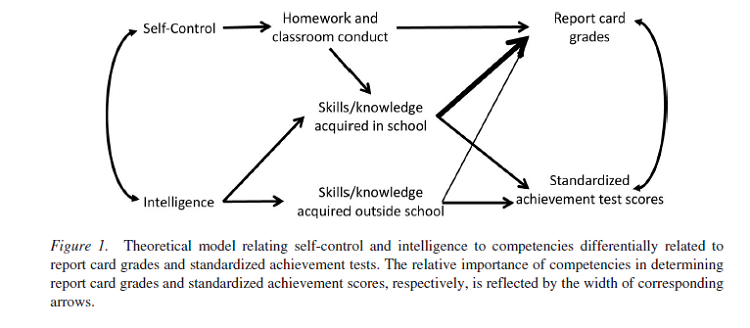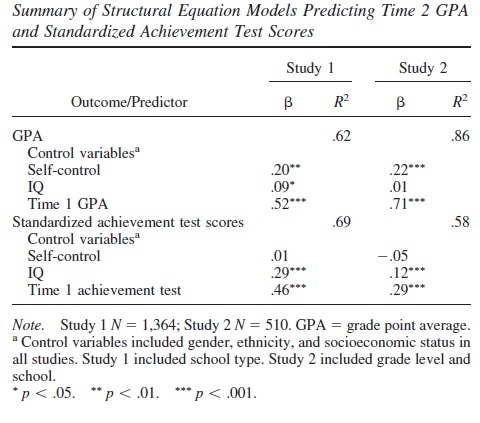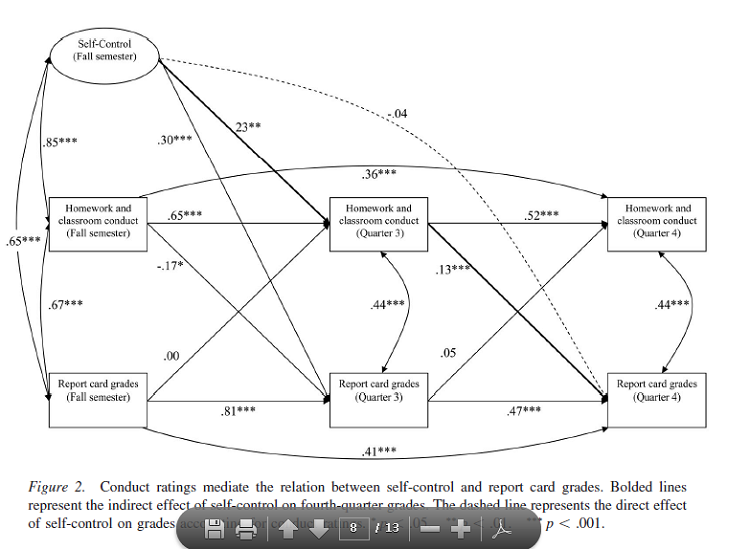This study tests the hypothesis that report cards and standardized assessments test different things – specifically, that report cards focus more on testing self-control, and standardizes assessments on testing intelligence
Their reasoning is that the individual components which build into a report card grade, like paying attention in class, doing homework, and showing effort, primarily require self-control.
On the other hand, standardized assessments often test things not taught in class. A person's ability and motivation to learn things outside of class, they hypothesize, primarily depends on their level of intelligence. The model below illustrates this hypothesis visually:
Their first study, of 1,364 students over their middle school years, confirms this hypothesis – self-control much better-predicted report-card grades than IQ, and IQ much better-predicted achievement test scores than self-control. It is unclear to me why self-control plays the small factor that is does in predicting standardized test scores – after all, even a smart person needs self-control to stay focused on learning skills and knowledge when outside of school.
In their second study, of 510 students, also over their middle school years, these results were replicated. In addition, it was found that most of the reason higher self-control translated into higher report-card grades was because of increased homework completion and improved classroom conduct.
Click here to learn more about self-control.
Study Details
Hypothesis: Standardized achievement test scores assess competencies determined more by intelligence than by self-control, whereas report card grades assess competencies determined more by self-control than by intelligence.
Study 1:
Hypothesis: Self-Control and IQ data can predict future changes in report card grades and standardized achievement test scores.
Method: 1,364 students in a longitudinal cohort provided their self-control and IQ in fourth grade, which was used to predict their provided report card grades and standardized achievement test scores during their middle school years.
Measures:
The teacher and parents of each student completed an observer-report measure of self-control.
Students completed an IQ test.
Schools provided report card grades, standardized achievement test scores, and demographic data.
Results:
Controlling for demographic variables, eight grade GPA, and fifth-grade achievement test scores, both self-control and IQ predicted ninth-grade report-card grades, and only IQ predicted ninth-grade achievement test scores.
Study 2: Replication of study 1 + an additional hypothesis.
Hypothesis: Homework completion and classroom conduct mediate the relationship between self-control and report card grades.
Method: 510 students, fifth through eighth grade, completed a number of questionnaires at the start of the year and provided additional data at the end of the year.
Measures:
Homeroom teachers, parents, and students completed two measures of impulsivity: one and two.
Students completed the Raven's Progressive Matrices test, a nonverbal test of fluid intelligence.
Schools provided report card grades, standardized achievement test scores, homework completion and classroom conduct, and demographic data.
Results: Similar to study 1.
In addition, improvements in homework completion and classroom conduct were found to mediate the relationship between self-control and report card grades.
See 54 Ways to Increase Your Happiness
Finally, if you want to level up your parenting skills, then check out this resource that will show you how to get your kids to listen WITHOUT yelling, nagging, or losing control.
P., Tsukayama, E. (2012). What No Child Left Behind leaves behind: The roles of IQ and self-control in predicting standardized achievement test scores and report card grades. Journal of Educational Psychology, 104(2), 439-451.



